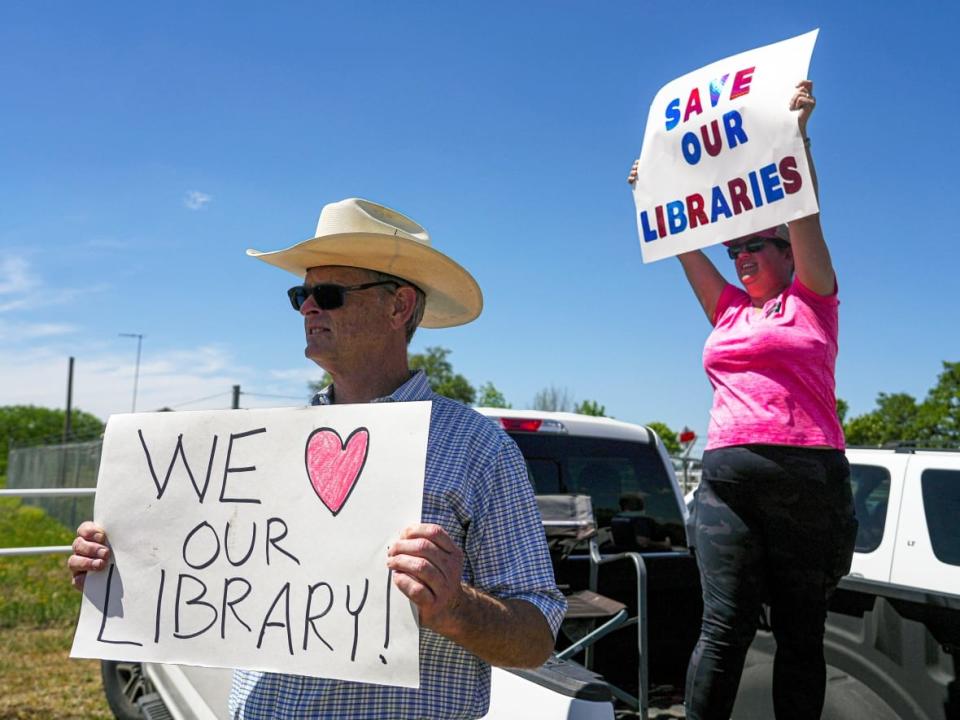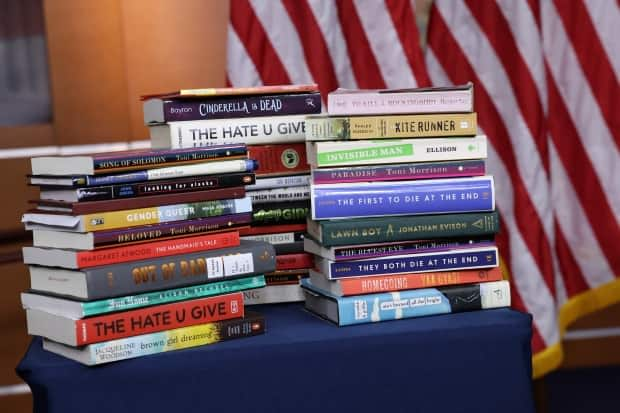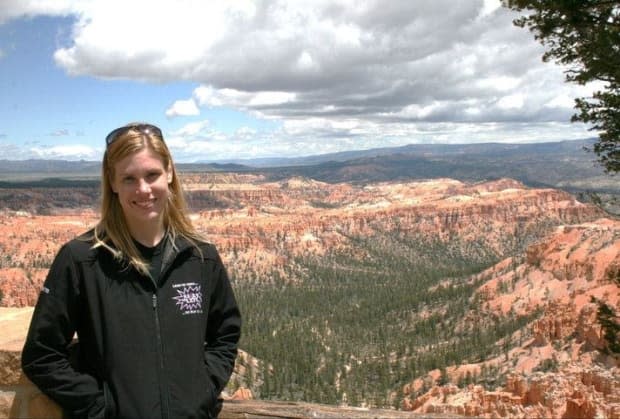Libraries are in the political crosshairs as they fight back against U.S. book bans

Libraries in the U.S. are on a new front line in a heated political battle over diversity and inclusion, not only contending with efforts to restrict books but also facing threats to their funding and operations.
State aid for all public libraries in Missouri remains in limbo amid a legal dispute over a policy that has seen a range of books pulled from school library shelves.
Officials in Llano County, Texas, considered closing public libraries rather than abiding by a court order to return banned books to the shelves, before backing down last week.
And, residents of a township in Michigan voted against a tax levy last fall to fund one of the community's only public libraries for the next 10 years, over the inclusion of LGBTQ books for young people in its collection.
It's all happening as lawmakers in Republican-led states put forward laws restricting transgender health care, drag performances and school curriculums related to race and LGBTQ issues. Those who monitor censorship see efforts to prohibit what books libraries can display and how they can operate as an assault on both diversity and democratic society.
Jonathan Friedman, director of free expression programs and education at PEN America, said attempts to "impose a narrow ideological world view" and to create an environment in libraries where certain identities and experiences are censored is "totally inconsistent with the idea of what a public library is supposed to be."
"Everyone should be able to go to a library and find books that represent their own identities that, you know, families want for their children to be able to read," he said.

Missouri vs. its libraries
Missouri became a flash point when the Republican-controlled House moved to withhold $4.5 million US for public libraries from the state budget because of an American Civil Liberties Union (ACLU) lawsuit challenging the constitutionality of a bill that prohibited "explicit sexual material" from school libraries. The ACLU said the decision was "retaliation" for the court case.
The Senate Budget Committee voted to return that funding to the budget plan on Wednesday, but it will still have to be approved by both levels of government and it's unclear whether the entire amount of aid will be restored in the end.
Kimberley Moeller, the president-elect of the Missouri Library Association, one of the organizations involved in the ACLU lawsuit, said any cuts to funding will affect all libraries' abilities to purchase books and resources, but rural libraries will suffer more than those in bigger cities with larger tax bases.

Another rule, introduced in the House by Secretary of State Jay Ashcroft last October, was specifically aimed at public libraries, requiring them to certify they have clear policies that limit "obscene" materials from being accessed by minors or they could face cuts to their funding.
Ashcroft, whose office is responsible for distributing library funding, told CBC News parents should have a say in what their children can access in libraries and they should be able to challenge materials they find questionable. He insists it's not an effort to censor or ban books.
"I assume no library is going to say, 'If anybody complains, regardless of how ridiculous the complaint is, we're going to burn the book,'" he said.
He feels that "just like most television" programs" there should be a means to let parents know if there is material they may not want to allow their children to access on their own.
Moeller said most libraries already have collection development policies in place that would prevent sexually explicit materials from being a part of their collections — especially when it comes to children's sections or school libraries — and there are already ways for the public to challenge books for review.
But she and other librarians question who defines what is "obscene" or inappropriate for children.
While there are some state guidelines in that regard, Moeller said the language of the Senate bill and the House rule are "so vague that it means that someone under 18 couldn't walk into the library without a parent."
In her view, a parent allowing their child to have a library card means that child has permission to access what the library has to offer.
LISTEN | The fight for libraries, 'the heart' of democratic freedom:
The challenge of book challenges
According to Moeller, the demands for book removals are not only increasing, she said, they appear to be part of an organized effort.
She said people are submitting entire lists that are circulating online, sometimes containing more than 160 titles at a time, without being able to fully justify why any one book should be banned because they haven't actually read the works in their entirety.
American groups such as No Left Turn in Education and Moms For Liberty have compiled long lists of literary works that should be challenged because they deem them unsuitable for minors for various reasons. Titles on Moms for Liberty's list, for example, include Toni Morrison's The Bluest Eyes, Margaret Atwood's The Handmaid's Tale, Milk and Honey by Canadian poet Rupi Kaur, and Khaled Hosseini's acclaimed novel The Kite Runner.
But generally speaking, Moeller said, the books that are being targeted are most often ones about LGBTQ issues, gender identity and racism. In some cases, it's also books that have some amount of sexual content — including books about sexual education — but not what libraries would consider obscene or pornographic.
LISTEN | How U.S. librarians are fighting back against book bans, threats to funding:
Censorship by any other name
University of British Columbia associate professor Florian Gassner explained there's a long history of governments censoring books and other content without actually admitting to censorship.
He described it as "regulation by raised eyebrow," in which governments don't outright ban specific materials but put rules in place that allow parents or community members to decide what is or isn't appropriate, with penalties if the library doesn't comply.

When it comes to protecting kids from inappropriate content, Gassner said book bans and library restrictions may not be all that practical as children can easily access graphic material by many other means, including smartphones.
He said the situation speaks more to "a rift" in society and how people position themselves on certain issues, but that it's "very dangerous and highly symbolic to start chipping away at our cultural archive" and the trove of information and ideas that libraries hold.
PEN America's Friedman sees it as "inherently repressive." He sees efforts to limit ideas and expression as "trending away from democracy" and the "very principles that have formed the bedrock" of how Americans view their own society.
Meanwhile in Canada
Gassner said Canadians would be wise to be "vigilant" about the attempts to ban books and put restrictions on libraries.
"Much of what happens in Canada is an aftermath of what happens in the United States," he said.
But according to Wendy Wright, chair of the Canadian Federation of Library Associations' Intellectual Freedom Committee and the director of the public library in Smithers, B.C., the political climate in the U.S. is already having an effect on libraries in this country, some of which have been the target of protests over the hosting of family-friendly drag story hour events.

She pointed to recent instances in Manitoba in which local councils have been approached by protesters demanding public libraries be forced to remove certain books or have their funding taken away.
There was also an incident in Chilliwack, B.C., in February, when the RCMP was called to investigate an unsubstantiated allegation that books in school libraries contained child pornography.
Wright believes it signals a "cultural shift" more than anything because libraries aren't doing anything different than they've ever done before in offering a wide range of books, services and programs to a diverse population with different perspectives.
"A truly great library has something in it to offend everyone," she said, adding librarians will defend maintaining collections of books across a spectrum of views – even those of the people currently fighting against libraries.
WATCH | U.S. divided over transgender rights:

 Yahoo Sports
Yahoo Sports 